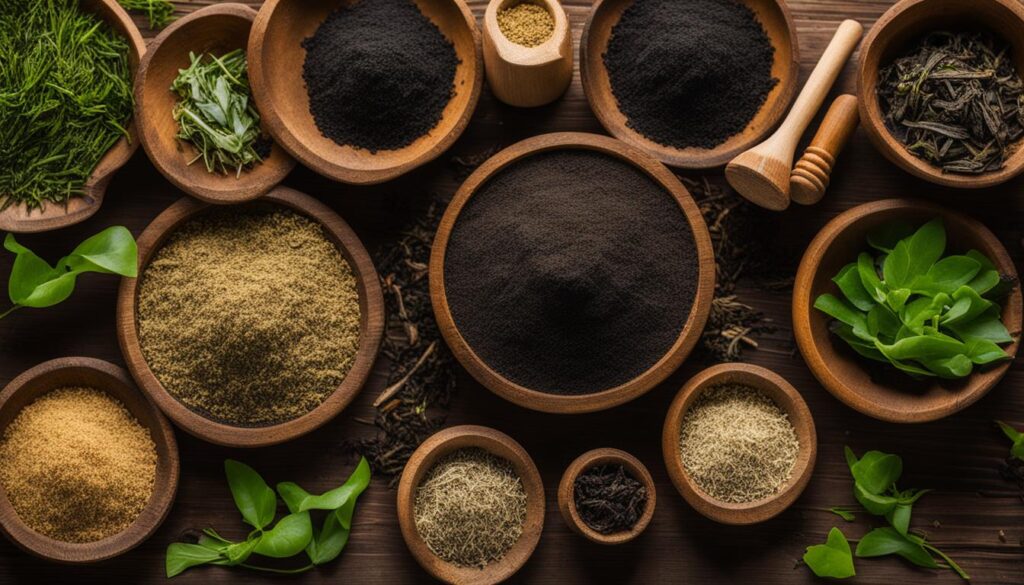Tea is a beloved cash crop with its numerous health benefits and distinct flavors. However, the use of chemical fertilizers in tea cultivation has led to land degradation and nutrient deficiencies. As advocates for sustainable and eco-friendly tea crops, we believe that organic fertilizers offer a natural and effective solution.
Organic fertilizers improve nutrient-use efficiency and soil fertility, making them an ideal choice for tea cultivation. While they may have lower nutrient contents compared to chemical fertilizers, this can be compensated by applying larger volumes. By striking the right balance between organic and mineral fertilizers, tea farmers can achieve optimal results.
Key Takeaways:
- Organic fertilizers offer a sustainable alternative to chemical fertilizers in tea cultivation.
- They improve nutrient-use efficiency and soil fertility.
- A balance between organic and mineral fertilizers is recommended for optimal results.
- Tea-specific organic fertilizers are available to address the unique nutrient requirements of tea plants.
- Using organic fertilizers can enhance the flavor and quality of tea.
Benefits of Organic Fertilizers in Tea Cultivation
Organic fertilizers offer numerous benefits in tea cultivation. One of the key advantages is improved nutrient-use efficiency, which means that the nutrients in organic fertilizers are more readily available for tea plants to absorb. This leads to better plant growth, development, and overall health. By using organic fertilizers, tea farmers can ensure that their crops receive a balanced and natural supply of essential nutrients.
In addition to improving nutrient-use efficiency, organic fertilizers also contribute to sustainable agriculture practices. Unlike chemical fertilizers, organic fertilizers are derived from natural sources and do not contain harmful synthetic chemicals. This reduces the negative environmental impact of tea cultivation and promotes the overall health of the ecosystem.
Another benefit of organic fertilizers is their ability to enhance soil fertility. When organic fertilizers are applied to the soil, they promote the growth of beneficial bacteria and improve soil structure. This not only enhances the nutrient content of the soil but also increases its water-holding capacity and nutrient retention. Healthy, fertile soil is crucial for the long-term productivity and sustainability of tea gardens.
Furthermore, organic fertilizers can contribute to the flavor and quality of tea. The nutrients present in organic fertilizers, such as amino acids and polyphenols, can enhance the taste, aroma, and overall sensory experience of tea. By using organic fertilizers, tea farmers can cultivate tea with unique flavors and characteristics that appeal to consumers who are increasingly seeking natural, eco-friendly, and sustainable products.
| Benefits of Organic Fertilizers in Tea Cultivation |
|---|
| Improved nutrient-use efficiency |
| Promote sustainable agriculture |
| Enhanced soil fertility |
| Contribute to flavor and quality of tea |
Types of Organic Fertilizers for Tea
The use of organic fertilizers in tea cultivation offers a natural and sustainable approach to nourishing tea plants. There are various types of organic fertilizers that can be used to promote healthy growth and enhance the flavor of tea. Let’s explore some of the most commonly used organic fertilizers for tea:
Cow or Sheep Manure
Cow or sheep manure, when composted, is an excellent source of organic matter and essential nutrients for tea plants. It enriches the soil with nitrogen, phosphorus, and potassium, promoting robust growth and improved yield. Composted animal manure also improves soil structure and moisture retention, creating an optimal environment for tea cultivation.
Plant-Based Fertilizers
Plant-based organic fertilizers, such as composted vegetable waste or cover crops, are another popular choice for tea cultivation. These fertilizers provide a rich source of nutrients, including nitrogen, phosphorus, and potassium, which are essential for plant growth. Plant-based fertilizers also contribute to soil fertility and microbial activity, supporting sustainable and eco-friendly tea farming practices.
Tea-Specific Fertilizers
To address the specific nutrient requirements of tea plants, tea-specific fertilizers have been developed. These fertilizers are formulated with the optimal ratios of nitrogen, phosphorus, and potassium for tea cultivation. They provide the necessary nutrients in a balanced and targeted manner, ensuring healthy growth, enhanced flavor, and high-quality tea leaves.
| Fertilizer Type | Benefits |
|---|---|
| Cow or Sheep Manure | Enriches soil with nutrients; improves soil structure and moisture retention |
| Plant-Based Fertilizers | Provides essential nutrients; enhances soil fertility and microbial activity |
| Tea-Specific Fertilizers | Targets specific nutrient requirements; promotes healthy growth and flavor |

Choosing the right organic fertilizer for tea cultivation depends on factors such as soil composition, nutrient requirements, and specific goals of the tea grower. A combination of different organic fertilizers, tailored to the needs of the tea plants, can be used for optimal results. By adopting these organic fertilizers, tea farmers can cultivate tea that is not only environmentally friendly but also delicious and nutritious for consumers.
Organic Fertilizer Application in Tea Cultivation
When it comes to applying organic fertilizers in tea cultivation, careful consideration is essential. Soil testing plays a crucial role in determining the nutrient content and pH levels of the soil. By understanding the soil’s composition, tea farmers can make informed decisions about the types and amounts of organic fertilizers to apply. This ensures that the tea plants receive the optimal nutrients for their growth and development.
The nutrient requirements of tea plants can vary depending on the specific cultivar and growth stage. Therefore, it is important to follow recommended rates and timings for organic fertilizer application. This ensures that the nutrients are available when the tea plants need them the most. By providing the right nutrients at the right time, organic fertilizers help maintain the health and productivity of tea gardens.
Organic fertilizer application also contributes to the overall sustainability of tea cultivation. By reducing reliance on synthetic inputs, tea farmers can minimize the negative environmental impact of chemical fertilizers. Organic fertilizers promote soil health and improve nutrient-use efficiency, making them a more eco-friendly option for tea farming. Furthermore, organic fertilizers offer cost efficiency in the long run by improving soil fertility and reducing input costs.
| Benefits of Organic Fertilizer Application in Tea Cultivation |
|---|
| Enhances nutrient-use efficiency |
| Promotes soil health and fertility |
| Reduces reliance on synthetic inputs |
| Minimizes negative environmental impact |
| Offers cost efficiency in the long run |
In conclusion, the application of organic fertilizers in tea cultivation requires soil testing, understanding nutrient requirements, and following recommended application practices. Organic fertilizers offer several benefits, including enhanced nutrient-use efficiency, improved soil health, and reduced environmental impact. By choosing organic fertilizers, tea farmers can promote sustainability and cultivate healthier, tastier, and more eco-friendly tea crops.
Impact of Organic Fertilizers on Tea Quality
The use of organic fertilizers can have a significant impact on the quality of tea. By enriching the soil with essential nutrients, organic fertilizers contribute to the overall flavor, aroma, and nutritional content of the tea leaves. Unlike chemical fertilizers, which often provide a quick but short-lived boost, organic fertilizers provide a slow-release of nutrients, resulting in a more balanced and sustainable growth of tea plants.
One key advantage of organic fertilizers is their ability to enhance the nutrient content in tea leaves. Organic fertilizers, such as composted animal manure or tea-specific fertilizers, contain a range of micronutrients, amino acids, and organic matter that promote the synthesis of quality compounds in tea. Studies have shown that organic fertilization can increase the levels of polyphenols, amino acids, and caffeine in tea leaves, enhancing their sensory attributes and nutritional value.
Table: Nutrient Content in Organic Fertilizers for Tea
| Organic Fertilizer | Nitrogen (N) | Phosphorus (P) | Potassium (K) |
|---|---|---|---|
| Composted Animal Manure | 1-3% | 1-2% | 0.5-1.5% |
| Tea-Specific Fertilizer | 2-4% | 1-3% | 1-2% |
| Composted Vegetable Waste | 0.5-2% | 0.5-1% | 0.5-1% |
Table: The nutrient content in organic fertilizers commonly used in tea cultivation. The exact nutrient composition may vary depending on the source and manufacturing process.
Overall, the use of organic fertilizers in tea cultivation not only enhances the quality of the final product but also supports sustainable and eco-friendly tea farming practices. Organic fertilizers contribute to the long-term health of the soil, promote beneficial microbial activity, and reduce the dependence on synthetic inputs. By choosing organic fertilizers, tea farmers can produce high-quality teas that are not only delicious but also environmentally conscious, meeting the demands of conscious consumers.
Organic vs Chemical Fertilizers in Tea Farming
The choice between organic and chemical fertilizers in tea farming is an important decision that can have significant effects on both the environment and the quality of tea crops. Organic fertilizers offer a more sustainable approach, promoting soil health and reducing the reliance on synthetic inputs. In contrast, chemical fertilizers provide precise nutrient control but can lead to soil degradation and environmental pollution.
Organic fertilizers contribute to soil improvement in tea gardens. They enrich the soil with organic matter, enhancing its fertility and nutrient content. By improving soil structure and microbial activity, organic fertilizers create a favorable environment for tea plants to thrive. As a result, tea crops grown with organic fertilizers tend to have higher nutrient content and overall quality.
“Using organic fertilizers in tea farming is not only better for the environment, but it also enhances the flavor and quality of the tea.” – Tea Farmer
Furthermore, organic fertilizers help tea farmers meet the demands of conscious consumers who are increasingly seeking environmentally friendly and sustainable tea products. By choosing organic fertilizers, tea farmers demonstrate their commitment to responsible farming practices and the production of healthier, tastier, and more eco-friendly tea crops.

Tea Garden Soil Improvement with Organic Fertilizers
Organic fertilizers are a vital tool for improving the health and productivity of tea gardens. By enriching the soil with organic matter, these fertilizers enhance its fertility and nutrient content, leading to stronger and healthier tea plants. One of the key benefits of using organic fertilizers is their ability to improve nutrient-use efficiency in tea cultivation.
When compared to chemical fertilizers, organic fertilizers release nutrients slowly over time, ensuring that the plants have a steady supply of nutrients for optimal growth. This results in reduced nutrient losses and enhanced overall plant health. Additionally, organic fertilizers contribute to the long-term sustainability of tea cultivation by reducing the reliance on synthetic inputs and minimizing the negative environmental impact.
While organic fertilizers may require larger volumes to be applied compared to chemical fertilizers, they offer cost efficiency in terms of long-term soil health and reduced input costs. The organic matter in these fertilizers improves soil structure, enhances water-holding capacity, and promotes the growth of beneficial soil microorganisms. All of these factors contribute to long-term soil improvement, creating a more sustainable and productive tea garden.
Soil health is crucial for tea cultivation, and organic fertilizers provide a natural and sustainable solution for tea farmers. By nourishing the soil with organic matter and improving nutrient-use efficiency, these fertilizers contribute to the overall health and quality of tea crops. With their cost efficiency and environmental benefits, organic fertilizers are a wise choice for tea garden soil improvement.
Conclusion
In conclusion, using organic fertilizers in tea cultivation offers a myriad of benefits for tea farmers and the environment. Not only do organic fertilizers improve nutrient-use efficiency and soil fertility, but they also contribute to the long-term sustainability of tea farming. By enriching the soil with organic matter, these fertilizers enhance the overall health and productivity of tea gardens, ensuring the cultivation of healthier and tastier tea crops.
While organic fertilizers may require larger volumes to be applied compared to chemical fertilizers, they offer cost efficiency in the long run. The investment in organic fertilizers pays off through improved soil health, reduced input costs, and minimized negative environmental impact. By choosing organic fertilizers, tea farmers can meet the demands of conscious consumers who seek eco-friendly tea products and contribute to the preservation of our planet.
So, let’s embrace organic fertilizers in tea cultivation and reap the benefits they bring. Together, we can improve tea garden soil, enhance nutrient-use efficiency, and cultivate tea crops that are not only delicious but also environmentally friendly.
FAQ
What are the benefits of using organic fertilizers in tea cultivation?
Organic fertilizers improve nutrient-use efficiency, enhance soil fertility, and contribute to sustainable agriculture practices by reducing chemical inputs and minimizing environmental impact.
What types of organic fertilizers can be used in tea cultivation?
Composted animal manure, plant-based fertilizers, and tea-specific fertilizers are commonly used in tea cultivation.
How should organic fertilizers be applied in tea cultivation?
Soil testing should be conducted to determine nutrient content and pH levels, and organic fertilizers should be applied at the recommended rates and timings to ensure optimal nutrient availability.
How do organic fertilizers impact the quality of tea?
Organic fertilizers enrich the soil with essential nutrients, resulting in higher nutrient content in the tea leaves. This can enhance the aroma, taste, and overall quality of the tea.
What is the difference between organic and chemical fertilizers in tea farming?
Organic fertilizers promote soil health, reduce reliance on synthetic inputs, and contribute to long-term soil improvement, while chemical fertilizers offer convenience and precise nutrient control.
How do organic fertilizers improve tea garden soil?
Organic fertilizers enrich the soil with organic matter, improve soil fertility, and enhance nutrient-use efficiency, contributing to the long-term productivity and health of tea gardens.
Are organic fertilizers cost-effective in tea cultivation?
While organic fertilizers may require larger volumes to be applied compared to chemical fertilizers, they offer cost efficiency in terms of long-term soil health and reduced input costs.





